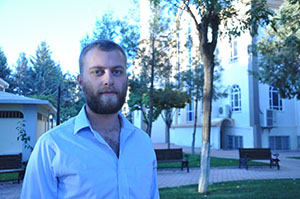
IRIS login | Reed College home Volume 96, No. 2: June 2017
Rescuing Survivors from Syria's Rubble
When surgeon Muhammad Abyad was killed in Syria on September 5, as he did humanitarian work for Doctors Without Borders, it was hardly an isolated incident. Hospitals are routinely bombed in the chaos of current-day Syria, and so far over 20 staffers for the Syrian Arab Red Crescent have perished while responding to disasters. On Monday, 50 medical professionals from across the globe united to publish an open letter in the Lancet saying that the Syrian health system is at a breaking point.
Somewhere in southern Turkey, Eliot Stempf ’11 knowingly nodded his head—and shifted in his low-rent desk chair as he contended with a glacially slow internet connection. Eliot lives in Gaziantep, Turkey, roughly 20 miles from the Syrian border, and is currently masterminding the launch of a humanitarian startup, SERA (Special Emergency Response and Assistance), which specializes in prehospital care and has so far trained roughly 50 Syrians to become emergency first responders.
SERA was founded in late 2012 by Peter Kassig, a 24-year-old Army Ranger and Indiana native who returned from Iraq intent on mitigating the carnage of war. Kassig, who’s an EMT, lives with Eliot in Gaziantep and frequently forays into war-torn Syrian towns like Deir Ezzor to lead training sessions, distribute supplies, and provide basic medical care. Eliot, meanwhile, remains in Turkey, hunched at his computer, networking with care providers, such as the Red Crescent, and conferring with two Syrian doctors who advise SERA on, as Eliot puts it, “how to deliver aid in a way that’s sensitive, without exacerbating political tensions.”
Last week, Atlanta-based Conscience International gave SERA its biggest contribution yet—$30,000 worth of medical supplies (mostly antibiotics and pharmaceuticals) to be distributed over the coming weeks.
“I’ve got a desk job—that’s all. It’s no more dangerous than driving on an American freeway at night,” Eliot says modestly, “but it’s very exciting. And we’re meeting a very definite need. Right now, if someone gets hurt in Syria, the standard of care is you just throw them in the back of a truck and drive fast to the hospital. There’s no one monitoring or caring for them on the way, and there’s a serious risk of spinal injury.” Medical care in Syria has become increasingly challenged in recent months as the well-financed, Al-Qaeda affiliate Islamic State in Iraq and Syria, or ISIS, has joined the fighting, with no compunction about killing medical providers that its leaders consider an enemy. “The vast majority of NGOs have pulled their non-Syrians out of the conflict zones,” says Eliot. “That’s why we’re training Syrians to provide care.”
The road to Gaziantep began at Reed. Eliot took Religion 155, Intro to Islam, his first year from Prof. Kyriell Noon [religion 2005–07] and was inspired to spend a semester in Cairo learning Arabic. After Cairo, he spent two months traveling about the Middle East, and became so enchanted with Lebanon that, after graduating from Reed with a degree in religion, he moved to Beirut and became the managing editor of Entrepreneur Levant, the regional edition of the American magazine Entrepreneur. By the time he met Kassig at a bar last fall, he says, “I’d been around entrepreneurs long enough that I wanted to launch my own startup.”
Eliot joined SERA and moved to Gaziantep in June. Today, he and Kassig share a $500-a-month apartment with SERA’s only paid staffers, a British IT guy, age 23, and a Syrian interpreter and logistics expert, age 24. “Our lifestyle is low-budget,” Eliot says. “You know, mattresses on the floor and plastic lawn chairs for furniture.”
Eliot spends very little time exploring Gaziantep, population 1.5 million. Mostly, he just works. When he talked recently to Reed magazine—over Skype, from a Gaziantep cafe with reliable WiFi—he was bleary-eyed, after staying up all night to writing a donor proposal letter.
He remains torn as to whether the U.S. military should intervene in Syria, and insistent that his friends back home tune into the complexities of the Syrian conflict. “We can’t just say, ‘This is another Iraq. Let’s stay out of it,’” he argues. “That kind of knee-jerk isolationism doesn’t work because Syria is a different country, and a different conflict. Every day, I talk to wonderful people, Syrians who are who seeing their country fall apart around them. These are people whose houses have been systematically bombed. They’ve seen their relatives indiscriminately tortured and killed, and their economy destroyed. I don’t think we can say, ‘Let’s not get involved.’ We need to do something to help.”



LATEST COMMENTS
steve-jobs-1976 I knew Steve Jobs when he was on the second floor of Quincy. (Fall...
Utnapishtim - 2 weeks ago
Prof. Mason Drukman [political science 1964–70] This is gold, pure gold. God bless, Prof. Drukman.
puredog - 1 month ago
virginia-davis-1965 Such a good friend & compatriot in the day of Satyricon...
czarchasm - 4 months ago
John Peara Baba 1990 John died of a broken heart from losing his mom and then his...
kodachrome - 7 months ago
Carol Sawyer 1962 Who wrote this obit? I'm writing something about Carol Sawyer...
MsLaurie Pepper - 8 months ago
William W. Wissman MAT 1969 ...and THREE sisters. Sabra, the oldest, Mary, the middle, and...
riclf - 10 months ago